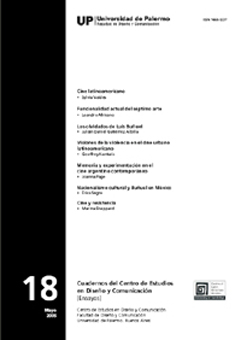Memoria y experimentación en el cine argentino contemporáneo
Abstract
This article analyses two Argentine films which are among the most innovative of recent years, both in
aesthetic terms and in their potential to open up new spaces for cultural and political debate. In Los rubios
(Albertina Carri, 2003) and Potestad (Luis César DAngiolillo, 2003), the deliberate subversion of conventional cinematographic processes is key to their exploration of the crisis of memory, identity and representation in contemporary Argentina. The article draws on a variety of cultural and film theories in its investigation of the complex relationship traced by these films between cinema and politics, and to assess the
importance of the contribution they make to contemporary debates on memory.
References
Bernades, H. (2003), Los desaparecidos, una investigación familiar, Página/12: Espectáculos, 24/04/2003, http://www.pagina12web.com.ar/diario/espectaculos/6-19225-2003-4-24.html.
Bordwell, D. (1985), Narration in the Fiction Film, London: Methuen.
. (1996), Contemporary Film Studies and the Vicissitudes of Grand Theory, Post-Theory: Reconstructing Film Studies (ed. D. Bordwell y N. Carroll), Madison: University of Wisconsin Press, pp. 3-36.
Bruzzi, S. (2000), New Documentary: A Critical Introduction, London and New York: Routledge.
Comolli, J.-L. and Narboni, J. (1999), Cinema/Ideology/Criticism, Film Theory and Criticism: Introductory Readings (ed. L. Brandy y M. Cohen), Oxford: Oxford University Press, pp. 752-59.
Freud, S. (1958a), Screen Memories, The Standard Edition of the Complete Psychological Works of
Sigmund Freud (trad. J. Strachey), London: Hogarth Press, vol. 3, pp. 303-22.
. (1958b), Remembering, Repeating and Working-Through, The Standard Edition of the Complete Psychological Works of Sigmund Freud (trad. J. Strachey), London: Hogarth Press, vol. 12, pp. 147-56.
García, E. (2003), Barbie y el Cuchu, dos nuevas estrellas en el cine de animación, Página/12: Espectáculos, 13/08/2004. http://www.pagina12web.com.ar/diario/espectaculos/6-24038-2003-8-13.html.
García, F. (2003), Un nombre marcado a fuego, Clarín: Sociedad, 9/11/2003, http://old.clarin.com/diario/2003/11/09/s-04602.htm.
García, L. (2003), Albertina Carri: La ausencia es un agujero negro, La Nación: Espectáculos, 23/04/
Hirsch, M. (1999), Projected Memory: Holocaust Photographs in Personal and Public Fantasy, Acts of
Memory: Cultural Recall in the Past (ed. M. Bal, J. Crewe y L. Spitzer), Hanover: University Press of New England, pp. 3-23.
Kracauer, S. (1947), From Caligari to Hitler: A Psychological History of the German Film, London: Dobson.
LaCapra, D. (1998), History and Memory After Auschwitz, Ithaca and London: Cornell University Press.
Lerer, D. (2003), La fábula de la reconstrucción, Clarín: Espectáculos, 23/10/2003, http://old.clarin.com/diario/2003/10/23/c-00909.htm.
Moreno, M. (2003), Esa rubia debilidad, Página/ 12: Radar, 23/10/2003, http://www.pagina12web.com.ar/suplementos/radar/vernota.php?id_nota=1001.
Nichols, B. (1991), Representing Reality: Issues and Concepts in Documentary, Bloomington and Indianapolis: Indiana University Press.
Pavlovsky, E. (2001), Prólogo, Potestad, Buenos Aires: Galerna, pp. 13-17.
Prince, S. (1996), Psychoanalytic Film Theory and the Problem of the Missing Spectator, Post-Theory: Reconstructing Film Studies (ed. D. Bordwell y N. Carroll), Madison: University of Wisconsin Press, pp. 71-86.
Sarlo, B. (2002), Tiempo presente: notas sobre el cambio de una cultura, Buenos Aires: Siglo XXI.
Schmucler, H. (2000), Las exigencias de la memoria, Punto de vista, 23: 68, pp. 5-9.
Smith, M. (1995), Engaging Characters: Fiction, Emotion, and the Cinema, Oxford: Clarendon Press.
Stam, R. (2000), Film Theory: An Introduction, Oxford: Blackwell.
Sturken, M. (1997), Tangled Memories: The Vietnam War, the AIDS Epidemic, and the Politics of Remembering, Berkeley: University of California Press.
Terán, O. (2000), Tiempos de memoria, Punto de vista, 23: 68, pp. 10-12.
Tirri, N. (2002), Pavlovsky, del teatro al cine, La Nación: Espectáculos, 18/01/2002, p. 4.
Turim, M. (1989), Flashbacks in Film: Memory and History, New York and London: Routledge.
Vezzetti, H. (2001), Lecciones de la memoria: a los 25 años de la implantación del terrorismo de estado, Punto de vista, 24: 70, pp. 12-18.
Los autores/as que publiquen en esta revista ceden los derechos de autor y de publicación a "Cuadernos del Centro de Estudios de Diseño y Comunicación", Aceptando el registro de su trabajo bajo una licencia de atribución de Creative Commons, que permite a terceros utilizar lo publicado siempre que de el crédito pertinente a los autores y a esta revista.


